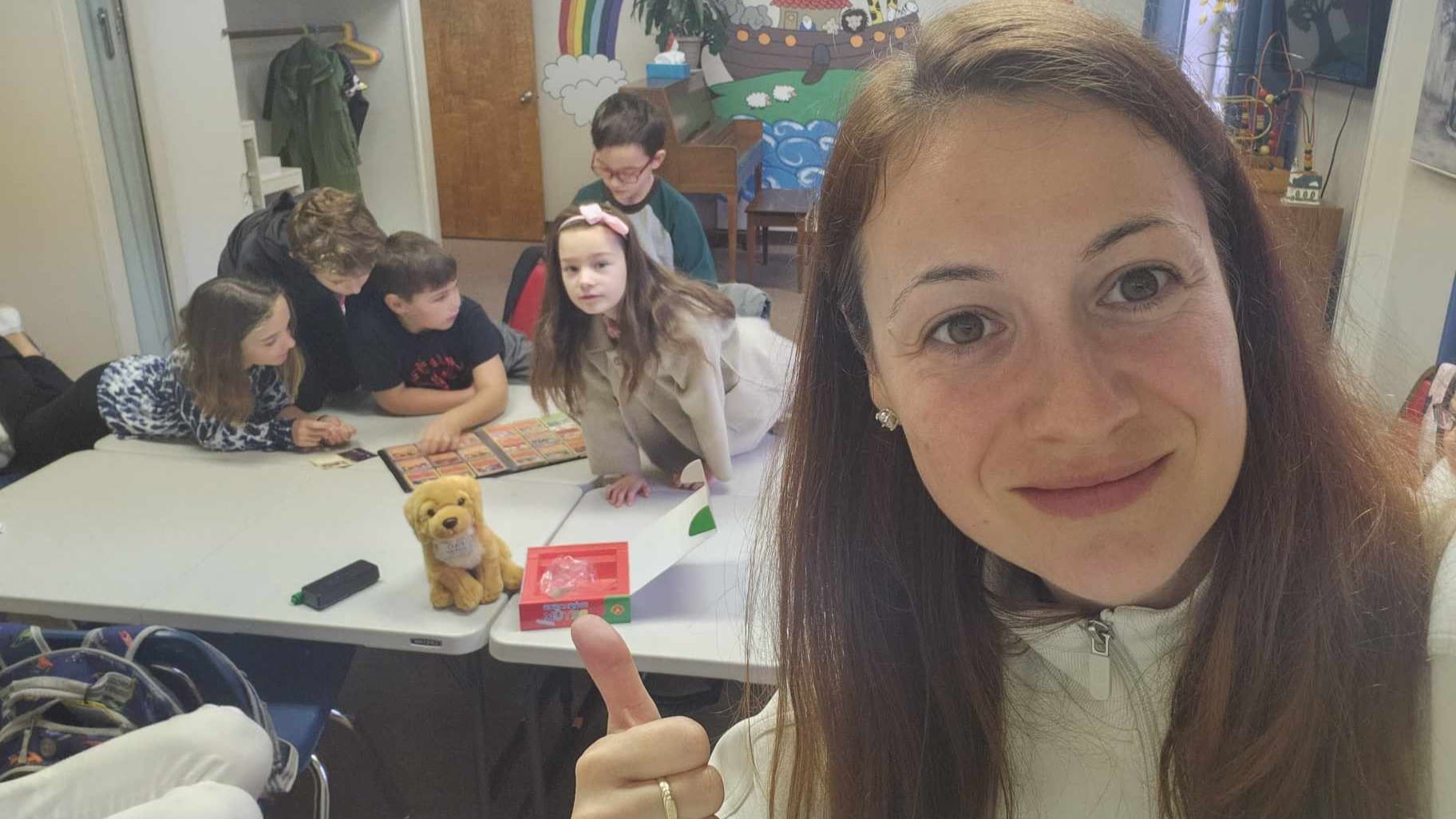On 19 May, a musical version of Zsigmond Móricz’s novel Be Faithful Unto Death was performed in the event hall of the Hungarian American Athletic Club (HAAC) of New Brunswick, NJ to celebrate the 50th anniversary of the Széchenyi Hungarian School and Kindergarten. The show, created over months of hard work and performed by students, teachers and parents, was a huge success. It was conceived and put on stage by Bernadett Csizmadia, who has been teaching at the school for ten years and has served as vice principal since 2023.
***
Why did you become a teacher and how did you end up in the US?
Before life led me to teaching, I faced a few bumps along the way. I was interested in many things, mostly related to people and acting. I applied to a high school in Miskolc that offered a drama curriculum but didn’t succeed. Then I wanted to be a reporter, but one of my high school teachers told me that I wouldn’t succeed as one, because that implies too much elbowing, which was not part of my character. I also considered majoring in psychology, but I soon dismissed it. During my studies, I always had classmates whom I helped catch up. Thus, it was slowly becoming apparent what I was really made for: teaching. Since I loved literature and grammar, I decided to become a Hungarian language teacher. After graduating at the faculty of the College of Nyíregyháza, I came to the US because I always thought that living abroad was my only chance to earn money and learn a language, since I came from a poor family in Mezőcsát in Borsod-Abaúj-Zemplén County. I started in Lakewood, New Jersey, like so many other people: with cleaning. I’ve never been afraid of physical work, but the harsh treatment was difficult to accept. While cleaning, I also started to babysit, which made it difficult for me to focus on my original chores, but it is due to the love I received from the children that helped me survive those years and so I didn’t give up.
How did you end up in the Hungarian school? What age group do you teach?
When I found out that there was a weekend Hungarian school in New Brunswick, I sent my CV to the principal at the time, Ildikó Bézi, and soon after I started working as a teacher and I have been teaching here ever since. I’ve worked with children of different ages, but in the end, it always turned out that the children closest to my heart were those aged 6–12. I’m that mother hen type of teacher. I consider them not a class, but a family or a team in which everyone is equally important.
The fact that we are Hungarians unites us, and whatever hardship we may suffer, we must never forget this.
I’m very grateful to the Széchenyi Hungarian School and to America for showing me what my real mission is. Before I left my homeland, I had no idea how important my Hungarian identity was to me. Over the years, I’ve realized that nothing makes me as happy as holding the hands of these little souls and singing the Hungarian national anthem together. It’s a miracle. Beyond teaching, my mission is to pass on my Hungarian identity to children of Hungarian origin living beyond Hungary’s borders.
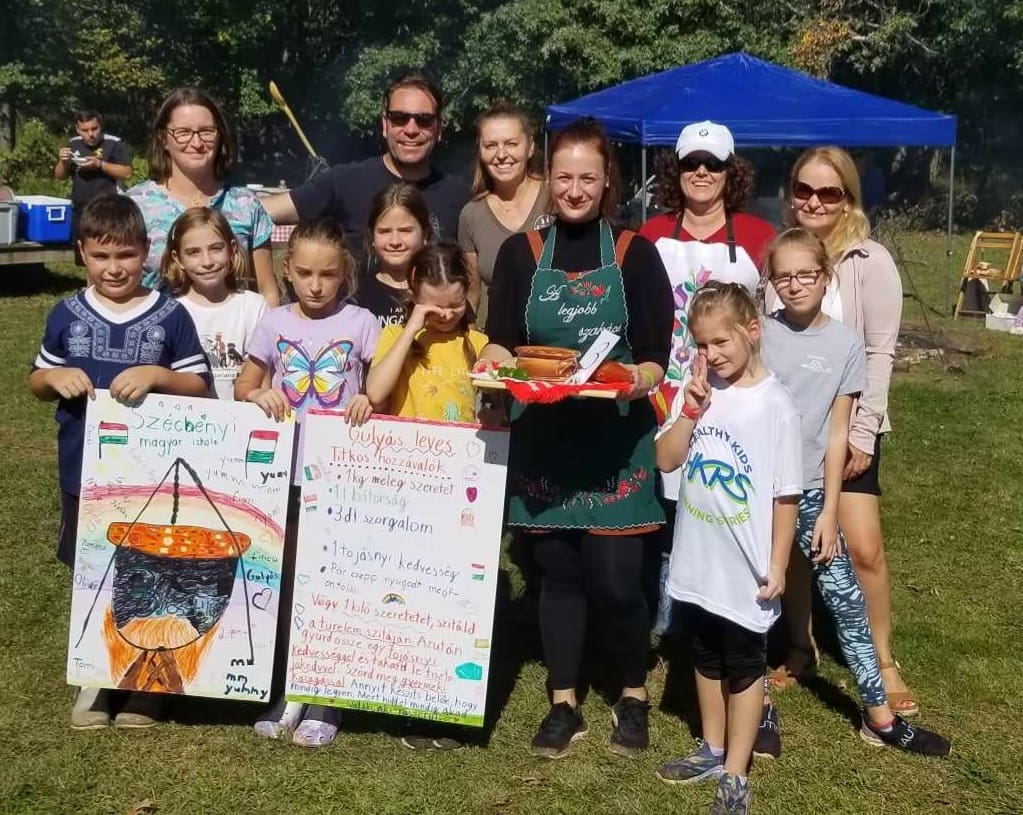
Let’s move on to the unique event with which you celebrated the 50th anniversary on May 19. How did you have the courage to volunteer for such a big project?
This was an old dream of mine and I thought there couldn’t be a better time for it. The aim of the show is to awaken the slowly fading Hungarian identity of second and third generation Hungarian families, and to practice the Hungarian language in an experiential way in a foreign environment. This is not just a show; it represents the unity of our community, the cooperation of our past and present students, teachers and parents; and, most importantly, our identification as Hungarians in a foreign country. I started here ten years ago with no teaching experience – which I am very happy about retrospectively, as I didn’t have any fixed preconceptions tied to the Hungarian school system –, and worked with several classes, age groups, and tried various methods. I strongly believe in experiential and drama pedagogy, where students are part of their own learning process as active participants in acquiring knowledge. In today’s dynamic and fast-paced world, certain abilities, skills, and competencies, such as effective communication, creativity, ability to collaborate, or critical thinking have become more valuable. At the same time, we shouldn’t forget that Saturday is the sixth day of school for these children, which is not mandatory, so we must make them love the Hungarian school, the Hungarian language and culture. Education can become effective if it responds to these challenges, which is unimaginable with traditional methods.
I’m in my fourth year teaching my current class. I don’t know if it’s due to my method or the ability of the class, but I remember that during a drama class, while the children were solving the assigned task in groups, I was recording a video of them for the parents and suddenly realized that the kids were instructing themselves as if I had done it myself. From that point, they’ve been happy to perform in any kind of school celebration. Maybe I was confident because I knew they could pull off even this huge show. Honestly, I had no idea whether I would be able to do it, and where the other characters would come from. My belief in children and my ‘nothing is impossible’ mentality have driven me forward. A few years ago, we performed the musical The Jungle Book directed by Timea Zsédely in cooperation with the Jókai Theatre from Békéscsaba. We played it in an off-off Broadway theatre in Manhattan, New York; I played Ka, the serpent. To be able to perform, we first needed to raise money by touring with smaller shows. I didn’t know what difficulties Timi had to face as a director, but I was part of a large-scale show and could learn from professional actors. It was a great experience and memory. With all these experiences behind me, I took the plunge…
Why did you choose Zsigmond Móricz’s novel, Be Faithful Unto Death?
I was sure I didn’t want a simple children’s piece. I knew I wanted to send a strong message, make people think and convey values. I believe that when we are born, we are good and pure. Then, as the years go by, a series of disappointments come upon us, and life begins to harden us.
As children, we learn from tales that good always triumphs and evil always gets its just punishment. Today, however, the opposite seems to be true.
Although Misi Nyilas’s fate is not revealed at the end of the script, his truth is revealed, so good triumphs eventually! I also knew that this novel was not for children of my class. But based on the experience of the past few years, I was also aware that there is no text or reading material that children cannot understand or learn. I didn’t throw the whole novel at them; instead, in the first weeks, we slowly got to know Misi Nyilas and his classmates through drama play. We imagined and acted out different characters and situations and shared our feelings and thoughts with each other. I also started using rarely used words and objects from the novel, writing them on paper and putting them in a box that I called pakk* from then on. We could only dedicate an hour of school time to rehearsals as I didn’t want to take more time away from regular teaching, but the play was present in the classroom all the time: songs from the musical were constantly played when they arrived in the morning and during the breaks. Thus, the children absorbed the ‘feeling of being faithful unto death’ without the slightest effort. When Friday and Sunday rehearsals started, the classroom buzzed with stories about shared moments, exciting events, and tales. I have always considered time spent together outside school important; it bring us closer together.
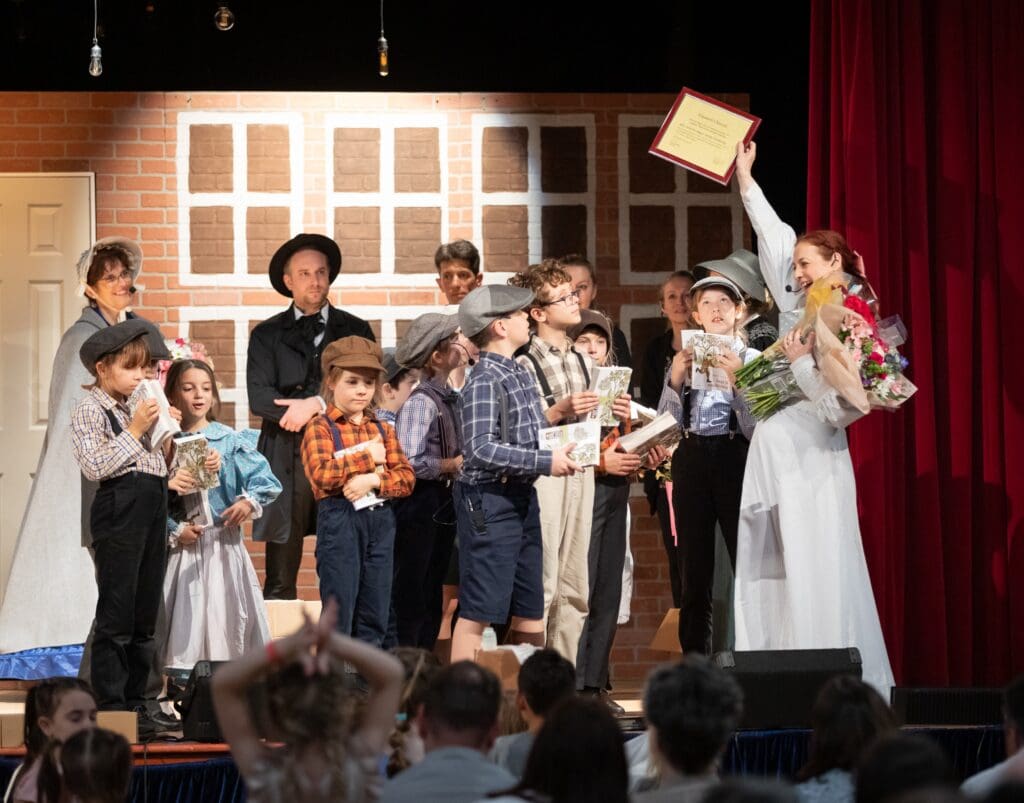
How did the casting procedure go?
Since we were preparing for the 50th anniversary of the school, I felt it was important to involve members of the local Hungarian community: past and present students, parents, and teachers. I thought it was a common cause. I also thought of it as a bit of a gift to Gyula Varga, who founded our school 50 years ago. I couldn’t imagine anything better to celebrate! Young and old performing together in Hungarian the musical version of this timeless novel, which is about human attitudes, faith, and love. Since it’s a musical, the casting wasn’t easy, because besides acting, it was important for the actors to be able to sing. I didn’t want to impose any role on anyone. I knew we had a big job ahead of us, and someone who only undertook it out of a sense of duty would not be able to put their heart and soul into it, and without that, it wouldn’t work. There were a lot of changes across the whole process. I had to rewrite the script several times, cutting parts and adding new ones. Nevertheless, those who performed would never forget Misi Nyilas, Zsigmond Móricz or his novel. Their Hungarian vocabulary has expanded, their acting skills have improved, and they have been enriched with a community experience that will stay with them for the rest of their lives. They owe this to their Hungarian identity and to their Hungarian weekend school.
Wasn’t there a regular, all-actor rehearsal process?
Not really. We had to rehearse in many small instalments, because I couldn’t put together a proper reading rehearsal, even online, let alone in person. Some adults had difficulty with reading Hungarian. I couldn’t ask the children to read the whole novel or even to watch the old black-and-white movie because they certainly wouldn’t have wanted to be part of the show afterwards. For a very long time, the children didn’t see the entire performance from start to finish, although they were aware of their own roles. The whole performance consisted of ten scenes, each very long and including choreography, vocals, and prose. I had to break up the scenes into parts, and once the parts were memorized, we rehearsed the whole scene together. I wanted to make the most of our time, knowing how tight everyone’s schedule was, so I planned the rehearsals weekly, usually on Mondays, coordinated with everyone, and held the Saturday scene rehearsals depending on who was available that week. For Saturday mornings, I scheduled singing rehearsals for the adults, with the music director, whilst I rehearsed the scenes with the children, or learned choreography or sang with them, depending on our progress. After school, there were scene rehearsals later on, followed by all-day Sunday rehearsals, and sometimes we had to rehearse on Friday nights as well. Until mid-April, the show wasn’t put together yet, so for a long time, the actors had no idea about the sequence of the scenes. I started every rehearsal by explaining where we were in the story and what everyone’s role was. This required constant consultation and a very systematic approach.
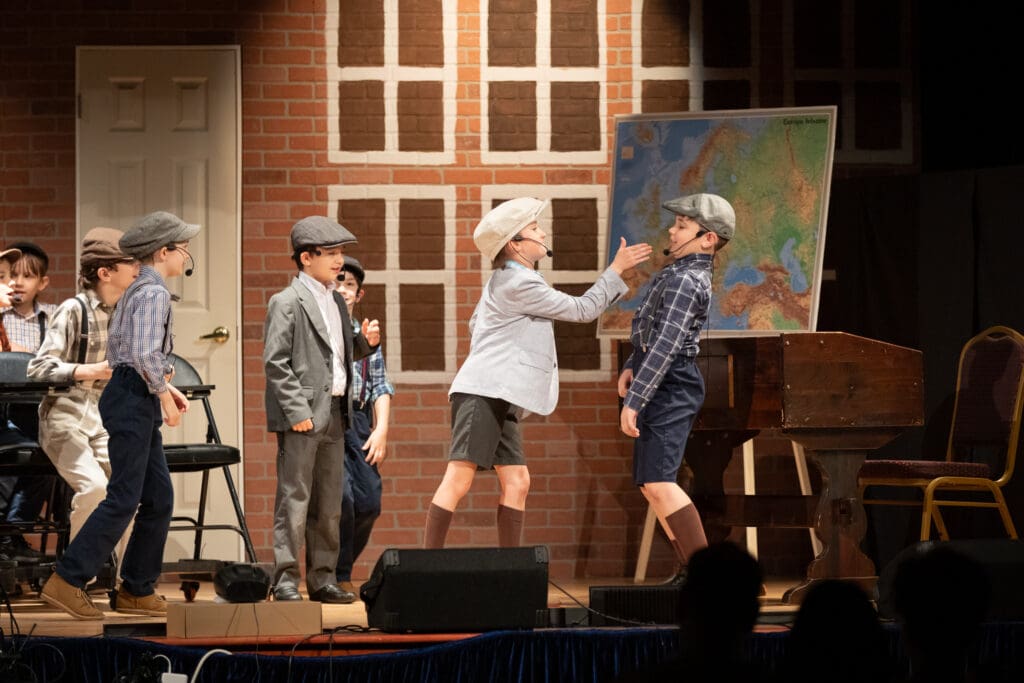
It wouldn’t have worked if the actors hadn’t given their best, shown up as agreed and taken it seriously. So big kudos to the final cast for their dedication!
Can you tell us a bit more about the actors?
József Petkes Siklódi became Misi Nyilas not because he has a superb voice, but because he embodies Misi with his childlike innocence and purity. Choosing the main character required also a supportive parental background, because Misi is present in all ten long scenes, with many prose parts, lyrics and choreography. Her mom, Tünde Siklódi, wholeheartedly supported this effort and gave up all other programs for the whole school year to be able to focus entirely on the show. Besides József, her two other children, Nicole and Adam, also acted. The music director was originally supposed to be Anna Tóth, our former school principal, but at the very end of last year she suddenly moved back to Hungary with her whole family, i.e. five actors, so I asked Ildikó Rozs to be the music director. She worked with the cast on the songs every Saturday in the Reformed Church for months and she also accepted to play Mrs. Doroghy’s role. Edina Lotzin, who played Viola, brought her two youngest children to rehearsals, and her daughter Violetta was also inspired to join. Lehel Orbán, playing János Török, loves to sing. Originally, I didn’t intend this big a role for him; however, by March, I changed his minor role to that of János Török, and in three weeks, he learned all his songs and lyrics. For Teacher Valkay’s role, I casted for a very long time and eventually found Dániel Janisz Indri, a KCSP (Kőrösi Csoma Program) scholar from New York. He had to commute from the City for rehearsals, which wasn’t easy, but he could manage it.
What about your role?
I wanted to perform from the beginning; that’s why I started this project. Initially, I planned to have Viola’s role, but Edina Lotzin was much better suited for that. I approached a lot of people for Bella’s role, but teenage girls just weren’t interested, so it remained mine. During the process, however, I realized how difficult it is to perform and direct at the same time. I couldn’t fully immerse myself in my role because I had to oversee the scenes from an external viewpoint. This dual task was incredibly challenging and required a lot of concentration. It didn’t get easier even after setting the scenes since we had to continuously adapt the rehearsal process. We could have full rehearsals on the Hungarian Club’s stage only a few times and we could only start them just a week before showtime. Another challenge was that we had to dismantle and store the whole stage set after each rehearsal, because the main stage was needed for other club events. When we couldn’t rehearse there, we used the nearby Scout Home. Our first major rehearsal was there, sometime in mid-April. Two weeks before showtime, we still didn’t know the transitions between scenes, which also had to be carefully planned, but it was extremely difficult without a stage.
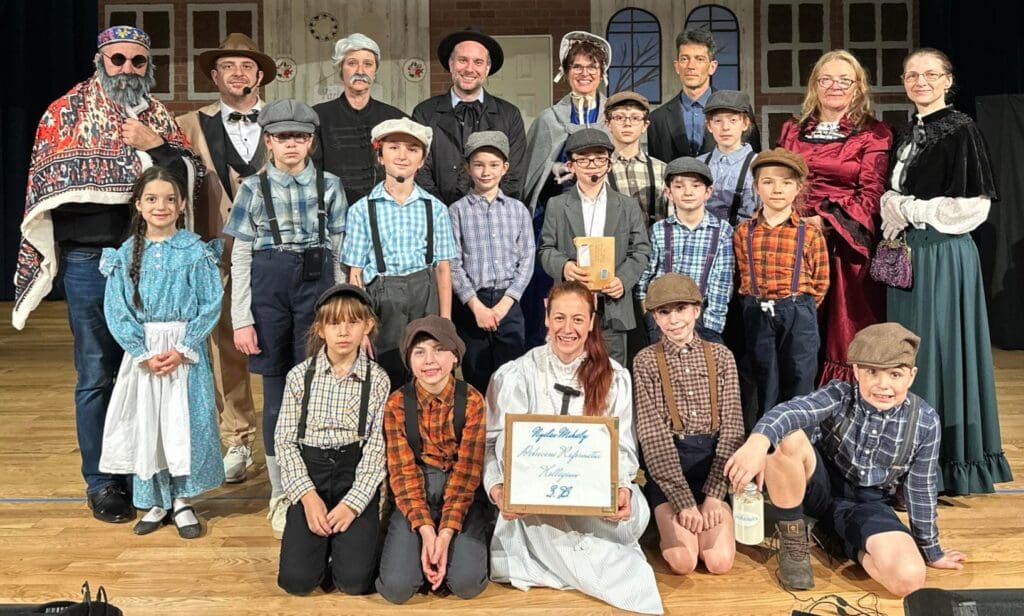
Who helped you during this challenging process?
When I started, I knew I couldn’t do it alone. The most important was the music director’s role, and Ildikó Rozs gladly accepted the challenge and worked with the cast on the songs for months. The original set design team started with four people, but in the end only Lívia Schachinger remained, whose two younger children also played. Zsolt Hodossy, the father of one of the children actors, built and managed the woodwork. Léna Elmes joined them on the day of staging the show. Another crucial help was that of the sound technician. Attila Szabó immediately said yes when I approached him about it and assured me he would help with everything. From the moment we started rehearsing with microphones, he was present at every rehearsal, even though he has no connection to the school; he’s a member of the Club. Sometimes, he had to be there at six in the morning so we could start the rehearsal with full sound technology at eight. During the last week before showtime, KCSP scholars Lili Balogh and István Dániel Molnár joined Attila as helpers with the technology.
I already mentioned Edina Lotzin, who was my right hand overall. Initially, she didn’t want to act. She is a working mother of four who also teaches at the school on Saturdays and sings in church on Sundays. But eventually, she joined. She also compiled the program booklet and provided the English translation, with Ildikó Bézi’s help. Since there would have been no performance without a venue, I must thank the leaders of the Scout House, Reformed Church pastor Zsolt Ötvös, Catholic priest Father Imre, Denisa Bott-Varga and István Varga from the Club for providing us with a place to rehearse and play. I am immensely grateful to all the parents and grandmothers who supported us, bringing the children to the rehearsals and feeding us along the way. On the day of the show, parents made and sold cakes and sandwiches to support the school in addition to the sale of tickets.
In summary, it was the dedication of everyone involved as well as of of the whole Hungarian community that made this performance possible,
despite all the challenges.
After the show, people contacted you asking to take the show on the road…
In fact, I was contacted even before by the Liszt Institute and the Hungarian Consulate General in New York. Since I had never directed a play of this size before, and because of the challenges, I couldn’t eat or sleep in the last few weeks before the show. When they approached me, I asked them to come to see it and if they still liked it, we would be happy to perform it again as we put so much work into it. I said this also because at the outset we were not taken seriously by the Hungarian community in New Brunswick. This made me even more determined to prove them wrong. After the performance, Consul Nikolett Szántovszki and Program Manager Noémi Sallai wanted us to perform in New York in June. However, we have Memorial Day weekend at the end of May, followed by the Hungarian Festival on the 1st of June, and then the end of the season comes. I even asked the parents, but in the end, I concluded: we were too tired for this. It would have been rushed, and I didn’t want to compromise on quality. So, I replied that from September on we will happily perform anywhere, we only need a month of rehearsals. Since then, Prof. Judit Kerekes has also approached me and asked me to stage the show at the annual meeting of Hungarian American Schools (AMIT) on the first weekend of October. I said yes, and they have already advertised it. The rest is still on the drawing board, but we are happy to take the show to any other Hungarian community in North America.
*Pakk is a loan word from German, meaning package, used much less now than in Zsigmond Móricz’s time. In the Móricz novel, when students received a package from home, it is referred to as a pakk.
Read more Diaspora interviews:

